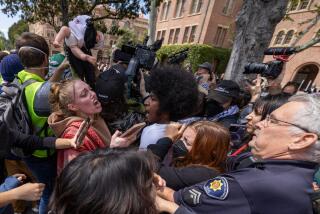Not all fun and Games
BEIJING — The Chinese have worked overtime to get all their checklists ticked, buildings built and security secured in the lead-up to the 2008 Olympics. But something seems to have happened on the way to the arena: They forgot the fun.
Fearful of political protests or terrorist attacks, Beijing feels increasingly battened down as the Aug. 8 opening ceremony approaches, leading some wags to predict a “fun-free” or “killjoy” Games. Many of the best things about Beijing, the little corners, the characters, the outdoor cafe tables, are being nibbled away by omnipresent police and neighborhood snoops in security overdrive.
Every Olympics host city has its own style, but the atmospherics at the last two Games have set a high standard to match. Revelers attending the 2004 Athens Games partied till dawn at street and beach venues replete with big bonfires, flowing ouzo and impromptu concerts. Organizers of the Sydney 2000 Games hired street musicians and jugglers to perform outside venues, and invited those without tickets to picnic beside huge outdoor Olympic viewing screens.
In China, however, tight visa policies have discouraged international visitors and pushed some longtime foreign residents out of the country, even as the government has banned most outdoor gatherings and told bar owners to close early. A plan by the 2012 host city London to throw a party in a downtown park was nixed. Officials have even forbidden picnic umbrellas in some districts, apparently fearful that terrorists or unruly protesters might lurk beneath the prosaic folds.
Authorities have also suspended outdoor music festivals, discouraged foreign entertainers and required Chinese, as well as foreign, bands to have their lyrics vetted. Encores must be approved in advance.
“For the government, fun is not part of the plan,” said Wang Feng, a professor of sociology at UC Irvine, who has just returned from Beijing. “What’s most important is not having any problems.”
The threat of terrorism is a serious concern for any host of an international event, especially one that’s welcoming 80 world leaders. But playing host is also a balancing act. Going overboard with security carries the risk of undermining the Olympic spirit, alienating visitors and, in this case, tarnishing China’s impressive preparations funded by billion-dollar budgets.
“They seem so paranoid,” said Ann Murphy, a law professor at Gonzaga University in Spokane, Wash. “I think they’re so afraid of shadows, they’re missing the whole point.”
Murphy, whose yearlong tenure as a Fulbright scholar in Beijing just ended, said that numerous times this month her family was visited or interrogated by police, airport security, neighborhood watch groups and housing managers.
“We were laughing that it was like being stalked,” she said. “We loved the people and the country, but the government really scared us.”
Even sponsors and corporate heavyweights find their blood pressure rising. Paul French, Shanghai-based founder of Access Asia, said the consumer marketing firm canceled a $500,000 party for a major international client after Chinese authorities barred outdoor venues, frustrated top executives seeking visas and made it clear that it would be difficult for athletes to leave the Olympic Village for meet-and-greet events.
“It just became one nightmare after the other,” he said. “It’s just not worth the hassle.”
Many of the rules handed down are vague and only verbally communicated, making it extremely difficult to plan with confidence, said another organizer who declined to be identified for fear of even tougher enforcement.
“You can’t see the bruises on my head,” he said. “I’ve been saying a prayer every night.”
Police this month issued a detailed list of restrictions on spectators. These include sleeping outdoors, wearing clothing with “identical designs” -- presumably a step that might in the government’s eye hint at a cause or political movement -- or unfurling banners, even if they just say “Go USA!” or “Go China!” Violators face 15 days in jail and a $70 fine.
The Culture Ministry has also been busy. A handful of dance clubs and bars have been closed, mostly around Worker’s Stadium. Karaoke clubs have been told to add transparent glass to private rooms under a so-called “Sunshine Project.” And earlier this month, the ministry announced a ban on all foreign entertainers who have ever “threatened the national sovereignty” of China. The action came after singer Bjork shouted “Tibet! Tibet!” during a concert in March in Shanghai.
China says it’s just enforcing its existing standards, including visa restrictions and a 2 a.m. bar closing
“We do want to have a festive atmosphere at venues,” insisted Liu Shaowu, security director for the Beijing Olympic Committee. “Most of our measures are in line with past Games practices.”
But others disagree.
“It’s really a shame,” said Tom Pattinson, editor of Time Out, an entertainment listings magazine, whose July issue for Beijing lists the best bars and nightspots. “Beijing had really bloomed in the past 18 months, but the next few months will be dull.”
Part of the disconnect may be China’s view of fun, some said. China has long been a food culture, built around eating lavishly with a close-knit group. For many people older than 40, the idea of going out to a bar and mixing with strangers, especially foreigners, is not particularly attractive.
“The notion of a multiracial globalized party, which much of the outside world sees as the Olympic spirit -- they don’t get it,” said French, the consumer marketer. “The idea of black and white people with their arms around each other kissing a policeman is not going to work.”
In another security move, the government has pushed many internal migrants and disgruntled petitioners out of Beijing and put activists in detention or under house arrest.
Australia, which had the luxury of acting as host in the pre-9/11 era, took a different approach, said David Richmond, former chief executive of the 2000 Sydney Olympics. For nearly a year, organizers met with potential protesters, including Aboriginal groups, to address their concerns and even set up Olympic displays that showcased their history and culture. Many foreign protesters ultimately put down their signs after a few days, Richmond said, as they got caught up in the spirit of fun.
Panos Livadas, a Greek government spokesman and past Olympic crisis-team member, said he warned China that with the job of being Games host comes criticism. But if visitors enjoy themselves, he said, the nation reaps huge long-term tourism and trade dividends.
“Having people come and have a good time is important,” he said. “And we know how to do it.”
Behind China’s clampdown, said political analysts, is a top-down, criticism-wary government nearly as fearful of a Tibet or Falun Gong protester as it is of a terrorist incident.
“Even though China says the Olympics shouldn’t be politicized, many Chinese find that funny given that people over 40 or 50 years old have been indoctrinated that everything is politics,” said Joseph Cheng, a political scientist at the City University of Hong Kong. “The model is ‘Nothing should go wrong, don’t take any chances, stability over everything.’ ”
In addition, officials’ main experience in organizing large events is buttoned-up Communist Party meetings in a system that offers little incentive to temper directives with some common sense.
“They’re used to controlling huge numbers of people but not in a way that’s always open or inviting,” said Tom Lansner, who teaches international media at Columbia University. “You never get much credit for sticking your neck out.”
Hong Huang, blogger and editor of iLook Magazine, said Olympic organizers weren’t terribly concerned about street parties or hoi polloi.
“China is one of the most elite societies you can imagine and if you’re part of the Olympics, you’re part of the elite,” Hong said. “It’s a way to say ‘We’ve made it, we’re the new hot kids on the block.’ ”
Hong has had her identity checked several times while walking on the streets, and her neighborhood now requires residents to “volunteer” their time watching for suspicious people.
“This is all going to make people feel that we’re somehow still living in a police state, which is unfortunate,” she added. “I felt we moved beyond that, but to revert to that, it’s too bad.”
Some, however, predict restrictions will ease once the Games are underway and officials are able to relax a bit.
“Even if you don’t have fun at the bars, people can go elsewhere,” said Jim Boyce, author of a blog on Beijing’s wine and night life activities.
“Most visitors will be thrilled to eat some Peking duck and go to the Great Wall. Barring a disaster, they’ll leave with a good impression.”
--
More to Read
Go beyond the scoreboard
Get the latest on L.A.'s teams in the daily Sports Report newsletter.
You may occasionally receive promotional content from the Los Angeles Times.






